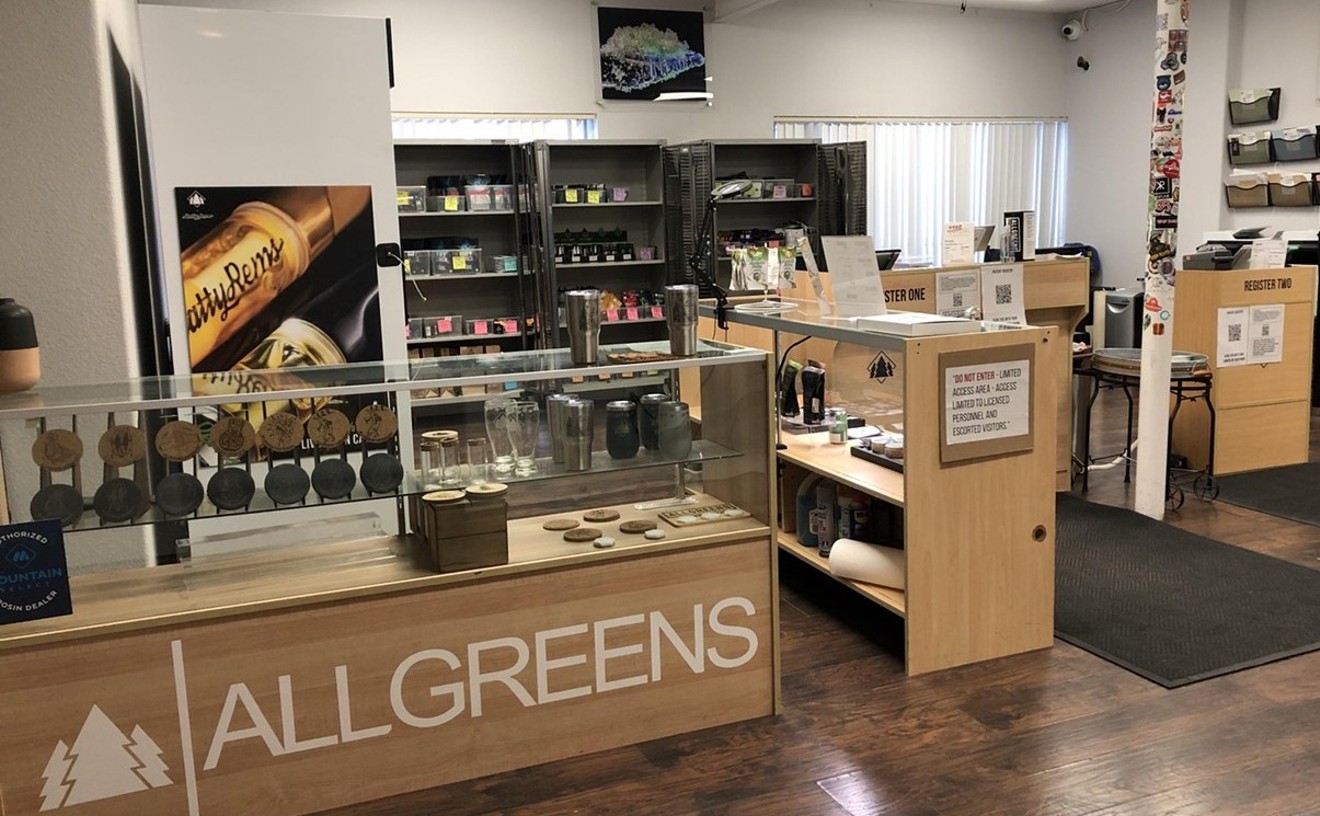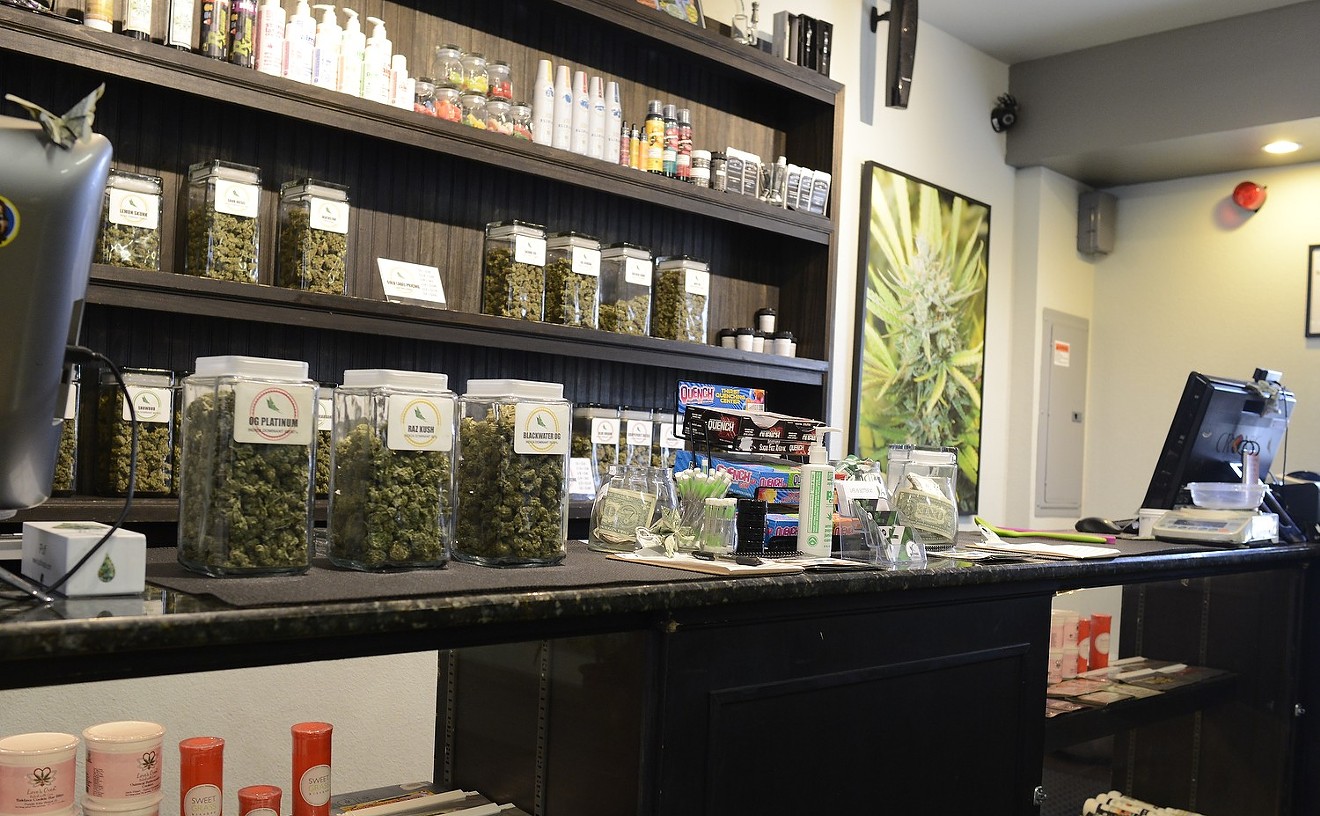The short answer: Yes.
Marijuana's Schedule I status with the Drug Enforcement Administration prohibits physicians from dishing out prescriptions for the plant or medicine derived from it. Epidiolex, developed by a subsidiary of GW Pharmaceuticals, will still be federally illegal to prescribe thanks to the DEA's designation, but Colorado's decision to legalize medical and recreational marijuana, as well as some recent state legislation, will enable doctors to ignore that federal law and allow patients to use health insurance to pay for the medication as early as September.
Allowing medical marijuana and being one of nine states to legalize recreational marijuana wasn't enough protection for Colorado doctors to prescribe it, forcing current MMJ physicians to "recommend" the plant to patients while banning pharmacies from dispensing it because it's not approved by the FDA. Although receiving FDA approval was an essential step for Epidiolex, being made from marijuana still defies the DEA's rules, so it will continue to be federally illegal to prescribe the drug until marijuana's Schedule I status is changed or abolished. To step around that obstacle, the Colorado General Assembly passed HB 1187 in April to allow doctors to prescribe the drug upon the FDA's approval, creating protections similar to those for synthetic THC medication, like Marinol.
According to Tetra Public Affairs founder and public policy consultant Samantha Walsh, who pushed for the bill and represents a number of CBD industry clients, Colorado's preemptive move will allow its doctors to prescribe the drug while other states with legal pot may have to wait. "The passing of 1187 lifted previous prohibitions on pharmacists from being able to dispense marijuana-based medicine. However, similar restrictions in other states have to be taken by a case-by-case basis," she says, hoping that other states will look at the measure as a template.
"Hopefully this will signal to regulators to get on the rest of the page with industry and the will of Congress, and allow for not only prescription-strength CBD, but full-spectrum hemp extracts as nutritional and wellness products. Similar to omega fatty acids, there exists prescription-strength and over-the-counter supplements," she adds.
Although its legality is murky, hemp-derived CBD is available for sale online and throughout the country, with many CBD businesses based in Colorado thanks to the state's relatively friendly laws for hemp farming and processing. All of those products are unregulated, however, leaving dosage and efficacy of CBD products — some of which are used to treat serious cases of epilepsy, chronic pain, anxiety and other conditions — without a government watchdog. All of those products will remain unregulated as Epidiolex comes to Colorado, but Tim Gordon, president of CBD manufacturer Functional Remedies, believes there's more than enough room for the hemp-CBD industry to continue its fast growth.
"This has been in preparation for a long time. It just made sense to see these three swim-lanes from up," he says. "You now have prominent cannabidiol products in the pharma lane — Sativex, Marinol and now Epidiolex. Then, you have the naturally-occurring products lane with hemp food and supplements, and you also have the over-the-counter lane at dispensaries."
Gordon says Epidiolex is essentially a CBD tincture made for oral ingestion, and there are many counterparts available on the retail market. However, it's extracted from marijuana, not hemp, he explains. The majority of CBD extractors use whole-plant infusion and CBD isolate techniques to make their products, according to Gordon, while Epidiolex is made by refining the marijuana concentrate down to a single molecule, which is removed of all THC before becoming the base for the medication.
Although some members of the hemp industry were concerned with allowing a pharmaceutical company into the CBD trade and writing special legislation to protect it, Gordon thinks the marijuana and hemp industries had no choice but to coexist with the pharmaceutical industry as it enters the cannabis arena. "This isn't a battle that we were going to win. This is the inception of creating these swim lanes," he adds. "While it's a thorn in my side that it's Big Pharma, it's also a feather in my cap because it's cannabis."
Read the FDA's full statement on the decision below:
"Over the past decade, we’ve seen a growing interest in the development of therapies derived from marijuana and its components. Proponents of “medical marijuana” advertised its uses for a wide number of medical conditions, such as cancer, multiple sclerosis, post-traumatic stress disorder and anxiety – just to name a few of the touted conditions. The FDA has been supportive of research in this area for many years. But marijuana is a Schedule I compound with known risks. Research to demonstrate that marijuana or its components could be safe and effective in the treatment of medical disorders should be held to the same standard as other drug compounds. And certainly it should not be held to a lower standard, as some proponents would suggest. The FDA has an active program to assist drug developers who want to investigate marijuana or its components through properly controlled clinical trials, to demonstrate the potential for safe and effective uses.
Today, the FDA approved a purified form of the drug cannabidiol (CBD). This is one of more than 80 active chemicals in marijuana. The new product was approved to treat seizures associated with two rare, severe forms of epilepsy in patients two years of age and older.
This product approval demonstrates that advancing sound scientific research to investigate ingredients derived from marijuana can lead to important therapies. This new treatment provides new options for patients.
This is an important medical advance. But it’s also important to note that this is not an approval of marijuana or all of its components. This is the approval of one specific CBD medication for a specific use. And it was based on well-controlled clinical trials evaluating the use of this compound in the treatment of a specific condition. Moreover, this is a purified form of CBD. It’s being delivered to patients in a reliable dosage form and through a reproducible route of delivery to ensure that patients derive the anticipated benefits. This is how sound medical science is advanced.
So today, in addition to celebrating this scientific achievement and the medical advance that it represents for these patients and their families, we should also reflect on the path that made this possible. It’s a path that’s available to other product developers who want to bring forth marijuana-derived products through appropriate drug development programs.
That pathway includes a robust clinical development program, along with careful review through the FDA’s drug approval process. This is the most appropriate way to bring these treatments to patients. This process also includes a review of the purity of a new drug and manufacturing controls. Before a high-quality drug can be developed, evaluated, and eventually approved by the FDA; it’s critical that the necessary work is done to identify drugs of potential medical benefit and conduct rigorous scientific research through adequate and well-controlled clinical trials. This is true for all drugs, including ones derived from plant materials, like marijuana. And the FDA remains committed to collaborating with federal and state agencies, researchers and product developers on advancing this type of important and conscientious work.
This research process – from early development through preclinical and clinical research – gives us a comprehensive understanding of a new drug. That includes an understanding of whether the new product is safe and effective for treating a particular medical condition, what the proper dosage is and for what populations it is safe and effective, how the new compound could interact with other drugs, or whether the new drug has side effects or other safety concerns.
This work also helps product developers identify the appropriate dosage needed to achieve the desired therapeutic effect while minimizing toxicity and risk. Taken in totality, the scientific evidence generated by these studies forms the basis of the FDA’s evaluation of benefit versus risk. And it’s because of this careful, scientific and evidence-based evaluation by the FDA that health care providers can rely on having a quality product that delivers a consistent, uniform dose of an effective medication that is able to deliver a predictable treatment to patients. This is especially important when considering treatment for serious medical conditions that will be utilized in the clinical care of patients who may have any number of health vulnerabilities. The purified form of the drug CBD approved today by the FDA has been shown to meet these rigorous standards.
Research on the therapeutic effects of marijuana and its components involves a number of federal agencies in addition to the FDA, including the National Institute on Drug Abuse, part of the National Institutes of Health, and the Drug Enforcement Administration.
The FDA has taken several specific steps to support this research.
We meet regularly with researchers as they plan and carry out their trials. We have also formed a Botanicals Team that provides scientific expertise on botanical issues for researchers developing drugs derived from plants, such as marijuana. That team published guidance for industry on clinical studies involving botanical drugs, as well as quality controls for lot-to-lot consistency. In recent years, the agency also has recommended to the DEA the approval of several hundred Schedule I research protocol licenses for research on marijuana or its constituent compounds.
Additionally, the FDA also works with companies to provide patients access to experimental therapies while clinical trials are ongoing through expanded access provisions. These approaches help protect patients while also allowing for the collection of data necessary to support the FDA approval of safe and effective therapies for use in the broader population. Through this process, hundreds of children were able to get access to investigational CBD products while this product was being studied.
Drugs derived from marijuana also are eligible for several programs that are intended to facilitate and expedite development and review of new drugs that address unmet medical needs in the treatment of serious or life-threatening conditions. Much of the work we’ve done to encourage research in this area has led to the approval action we took today.
The FDA will continue to support rigorous scientific research on potential medical treatments using marijuana and its components that seek to be developed through the appropriate scientific channels. However, we remain concerned about the proliferation and illegal marketing of unapproved CBD-containing products with unproven medical claims.
The promotion and use of these unapproved products may keep some patients from accessing appropriate, recognized therapies to treat serious and even fatal diseases. The FDA has taken recent actions against companies distributing unapproved CBD products. These products have been marketed in a variety of formulations, such as oil drops, capsules, syrups, teas, and topical lotions and creams. These companies have claimed that various CBD products could be used to treat or cure serious diseases such as cancer with no scientific evidence to support such claims. We’ll continue to take action when we see the illegal marketing of CBD-containing products with unproven medical claims. We’re especially concerned when these products are marketed for serious or life threatening diseases, where the illegal promotion of an unproven compound could discourage a patient from seeking other therapies that have proven benefits.
Today’s approval demonstrates our commitment to the scientific process and working with product developers to bring marijuana-based products to market. We remain committed to our gold standard for product development and review. Such a process ensures that any new therapies from marijuana and its constituents are safe, effective and manufactured to a high and consistent quality. And most importantly, that these products have been proven safe and effective for patients.
The FDA, an agency within the U.S. Department of Health and Human Services, protects the public health by assuring the safety, effectiveness, and security of human and veterinary drugs, vaccines and other biological products for human use, and medical devices. The agency also is responsible for the safety and security of our nation’s food supply, cosmetics, dietary supplements, products that give off electronic radiation, and for regulating tobacco products."












